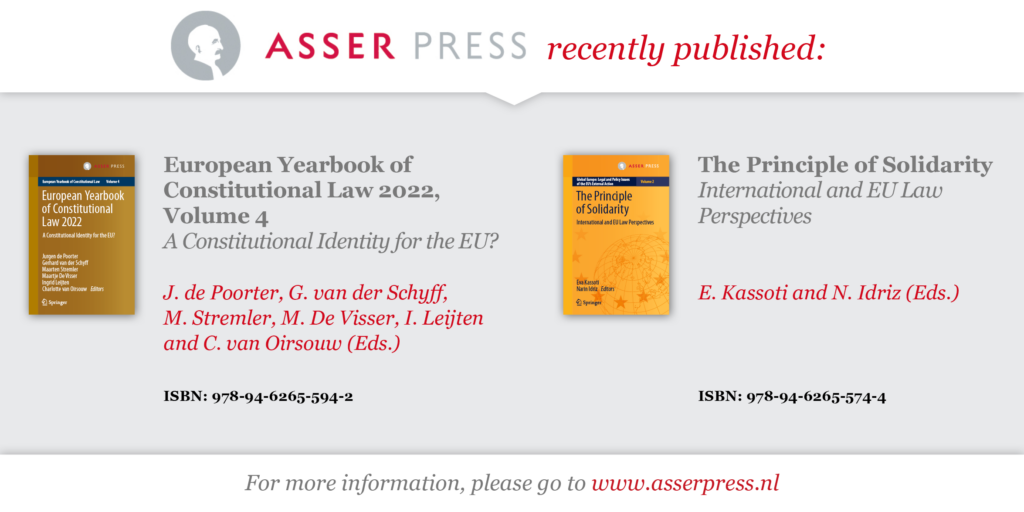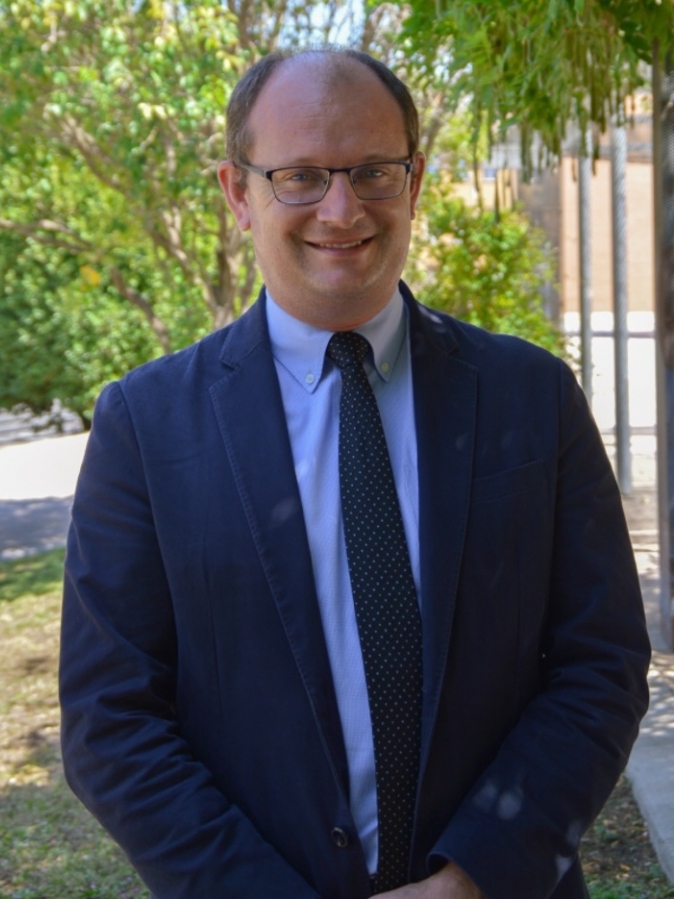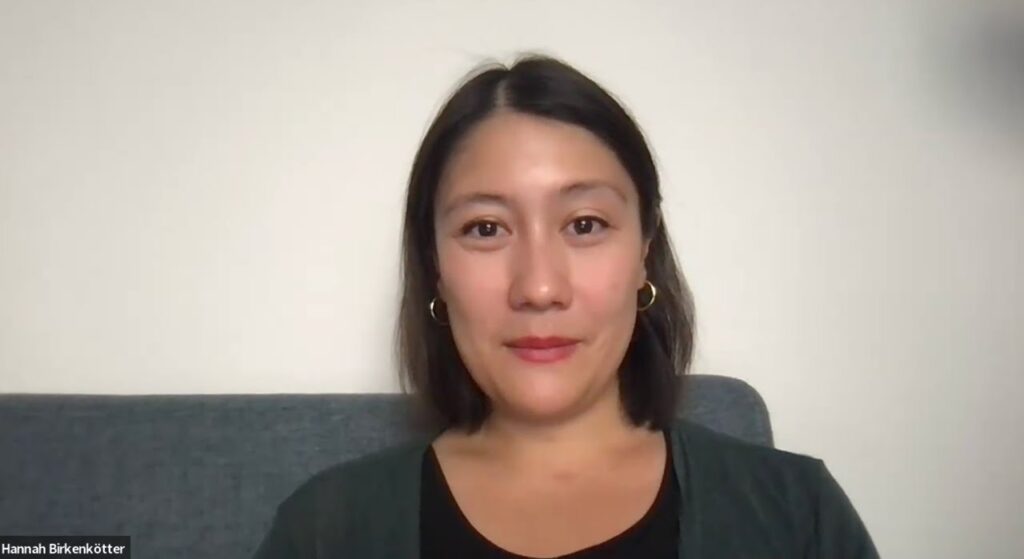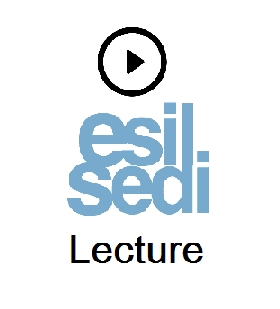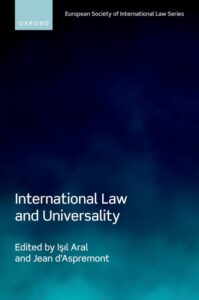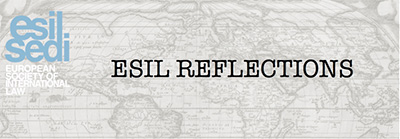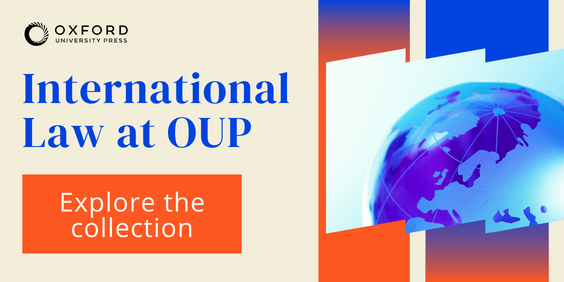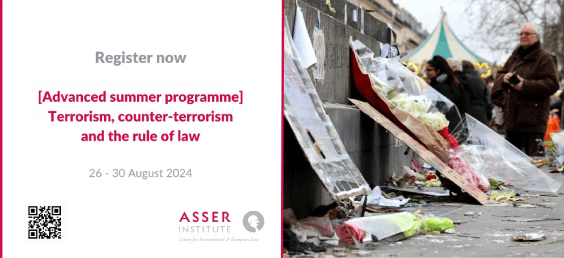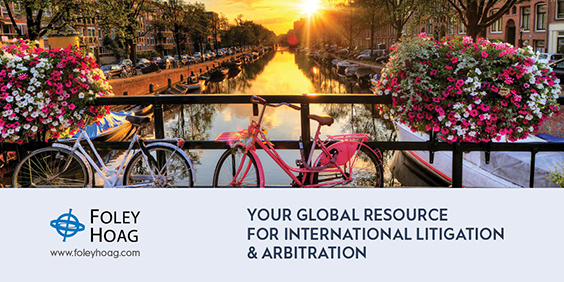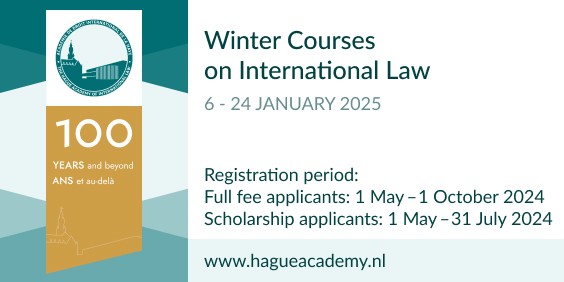ESIL Newsletter – Spring 2024
Editor: Helmut Aust (Freie Universität Berlin)
 In this issue
In this issue
1. Message of the President
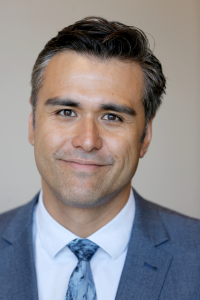
Dear ESIL members,
As spring beckons, you will certainly be aware that 2024 marks the 20th anniversary of ESIL’s Founding Conference, during which our Society came into being. The Conference was held in Florence, seat of the European University Institute and of our valued Secretariat. Perhaps it is apposite, then, that to Florence we returned for a gathering in February 2024, where representatives of the Board and a number of additional contributors were brought to reflect on our achievements and successes, and to guide our activities and efforts as we enter our third decade. Deliberations have been wide-ranging and will resume in May; and we hope to make some exciting announcements during the Annual Conference in Vilnius on the future of the Society.
Against this background, I thought it opportune to take up one of the enduring themes at all levels of ESIL, namely, our European vocation and identity. In 2024, what does it mean to be the European Society of International Law? What specific intervention in the international law profession can be made from an explicitly European vantage point; and does such a perspective necessarily reproduce the hierarchies and Eurocentrism of the past, and limit international law’s universality? These questions have been with our Society from its beginning, with the 2004 Founding Conference Report acknowledging the ‘inevitably elusive’ character of ESIL’s ‘European-ness’.
I dare venture that the past two decades have lived up to some of the initial aspirations for our young Society. ESIL has continental and global reach, gathering members from a wide range of origins in Europe and beyond, and with an explicit ethos of nurturing cross-cultural understanding. We are the largest non-national society of international lawyers in Europe, and our creation has been paralleled by the emergence of regional societies in Latin America, Africa and Asia. Our regional societies are a complement to long-established national societies of international law, providing an alternative forum for scholarly interaction and dialogue. What is more, recent efforts have been launched to intensify dialogue between national and regional societies of international law through a global network of learned societies.
I would also put forward that our Society is not merely a site, or a forum, for international legal scholarship. Global history, and the place of Europe within that history, open a space to reflect on the distinctive European contribution to international law. Our scholarship may seek to excavate whether there is a common European tradition or understand the legacy of European engagement with non-European regions. Such scholarship ought rightly to engage with the problematic aspects of colonialism and imperialism that shaped international law’s past and colour its present. Such scholarship can challenge structural Eurocentrism, and contest when local European experiences have masqueraded as universal. It might also seek to understand how Europe and Europeans have, just as with any other local or particular approach, influenced or used international law. These varied approaches are all welcome within ESIL.
Of course, vibrant scholarship on international law—and Europe’s role within it—take place beyond the Society. Accordingly, our Society will seek to nurture the scholarship of all its members, no matter their background, and collaborate with other learned societies to continue to advance our understanding of international law and the contribution it has made to the world.
I conclude on a personal note. Canadian by birth, an immigrant to Europe, and partly European, partly non-white, by descent, the Society has proved incredibly welcoming to me and a crucible for my intellectual ambitions. Safeguarding that openness is our Society’s vocation, so that our members may contribute to the discipline on their own terms, and always in a culture of respect and toleration. We may be European in origin and geography, but we are equally committed to the universal aspirations of international law.
Yours faithfully,
Gleider Hernández
ESIL President
2. Guest Editorial by Mirko Sossai: The Fate of Cities in Conflicts: From Urban Warfare to Urban Diplomacy
The archaeologist and art historian Salvatore Settis once wrote that cities tend to die in three different ways: when a ruthless enemy destroys them; when foreign invaders violently colonize them, driving out the indigenous inhabitants and their gods; or, finally, when their citizens forget who they are and become strangers to themselves. Military historian Roger Spiller also emphasized that, “being chiefly human, cities can be killed”. Civilians are five times more likely to die in urban offensives than in other battles. Already in 2018, the UN Security Council, with resolution 2417, recognized the correlation between armed conflicts and food insecurity. In ordering new provisional measures in the case brought by South Africa against Israel, last March, the International Court of Justice observed that “Palestinians in Gaza are no longer facing only a risk of famine, … but that famine is setting in”. From Gaza to Yemen, Ukraine to Sudan, food and hunger have been used as a weapon, through the destruction of objects indispensable to the survival of the civilian population and the denial of humanitarian assistance. Even attacks on aid workers are becoming more and more frequent. The war crime of starving civilians as a method of warfare continues to reappear in different disguises in our time.
Urban warfare has caused unprecedented rates of destruction of civilian homes, critical infrastructures providing essential services, and cultural heritage sites, such as houses of worship, museums and archives. As of 8 April 2024, UNESCO has verified damage to 43 sites in Gaza, including 10 religious sites and 24 buildings of historical and artistic interest. During the Balkan wars in the 1990s, the term “urbicide” emerged to convey the widespread and deliberate destruction of urban buildings as a specific form of violence. As highlighted by several recent ICRC reports, the humanitarian consequences extend beyond the damage caused to the people remaining in the cities during fighting to include the effects on the civilians who flee and on those who subsequently seek to return home. In the 2022 Political Declaration on the Use of Explosive Weapons in Populated Areas, these severe and long-lasting indirect effects are referred to as “reverberating effects”, which talso include the psychosocial harm on civilians. Urban structures are not mere buildings: homes constitute the repository of intimate moments with family and beloved ones, and cultural property reflects the memory and the identity of a people. The devastation of heritage sites in a city risks to disconnect generations of inhabitants from their historical and cultural roots.
For the survivors of the World War Two aerial bombardments against urban areas in Europe and Japan, the coming of the bombs – conventional as well as nuclear ones – was a personal event before it was a global one. Luck or destiny saved both their life and their voice, which they have used to tell the world their long-lasting sufferings and to advocate for the repudiation of war. The desire for “never again” fostered the commitment of cities to peace and reconciliation, for instance through the establishment of twin-city partnerships. In some cases, relations between cities even preceded the establishment of diplomatic relations at the national level. In 1954, in a speech at the ICRC headquarters in Geneva, the Mayor of Florence, Giorgio La Pira articulated “the right of cities to exist” and to be preserved from the effect of hostilities and nuclear destruction, and theorized a role for cities and mayors in peacebuilding. Nowadays, local authorities across the world continue to refer to global norms and practices in the context of peace and security, be it for macro-level questions like nuclear disarmament or more practical issues related to humanitarian assistance and refugees. Although urban diplomacy has since certainly evolved towards forms of transnational networking, woth the participation of thousands of local goverments, city-to-city diplomacy has kept its relevance, involving also small and mid-size towns, as evidenced by the wave of solidarity following Russia’s aggression against Ukraine. Bottom-up initiatives of territorial cooperation between local governments channeled multilevel responses: various cities offered help for displaced persons, provided humanitarian supplies to Ukrainian municipalities and other actors of the civil society, and promised support for post-war reconstruction programs.
With their generous humanitarian aid, sister cities can act as ‘pioneers’, pulling others to action and exerting pressure upon national governments and international organizations for more humane and pragmatic policies. Solidarity among cities keeps the hope for urban peace alive when everything else around speaks of death.
*Mirko Sossai, Professor of International Law at Roma Tre and Co-Rapporteur of the ILA Committee on Urbanization and International Law – Potential and Pitfalls
3. Meet an ESIL member – Hannah Birkenkötter
You can find the video introducing Dr. Hannah Birkenkötter, Associate Professor of International Law at the Instituto Tecnológico Autónomo de México (ITAM), here.
4. What’s Going On?
 2024 ESIL Annual Conference in Vilnius – REGISTER NOW!
2024 ESIL Annual Conference in Vilnius – REGISTER NOW!
The 19th ESIL Annual Conference (5-6 September 2024) will be hosted by the Law Faculty of Vilnius University in Lithuania with Go Vilnius, the Ministry of Foreign Affairs, and the Ministry of Justice of the Republic of Lithuania as partners of the conference. The conference will be preceded by Interest Group pre-conference workshops on 4 September 2024.
The theme of the annual conference is ‘Technological Change and International Law’.
Five exciting fora are planned for the conference.
The first forum is on race and technology because covered under the cloak of neutrality, emerging digital technologies both obscure and amplify forms of racialised violence – from the digital border to digital media and the digital battlefield. This forum engages with these technological changes with the critical aim of conceptualizing and countering how race operates as a technology of global ordering and how international law served and continues to serve as a technology of racialization.
The second forum is questioning what is the role of human rights in the digital era? Can the existing body of human rights be extrapolated and extended from the analogue to the digital, from the offline to the online world? Or do the technological changes that we face pose more fundamental problems for the conceptual cohesion and social value of our legal language and practices? Focusing on both emerging challenges and responses, this forum explores human rights in a digital age.
The third forum is asking if dispute resolution can be automated. The proliferation of new digital technologies impacts the way international law rules are applied, interpreted, and adjudicated. This turn to automation has important institutional and normative effects that amplify inequalities and impact prospects of judicial discretion, teleological interpretation, and the progressive development of international law.
The fourth forum explores the growing use of algorithmic tools, cyber operations and drones in contemporary warfare. These developments raise concerns about civilian protection and the limits of lethal violence. Yet, it also asks foundational questions: is our legal framework of restraint and responsibility attuned to these algorithmic agencies?
The fifth forum is investigating the place of international law in the digital era? In this forum we engage with more structural concerns: how have new digital technologies affected and altered the core categories of international law – from its subjects and sources to the idea of sovereignty itself? How have emergent practices of global governance by data displaced and disrupted the territorial and temporal coordinates of international law and its (often exclusionary) ideals of the global community?
The preliminary programme is available. The early bird registration for the conference is open until 1 June 2024.
The invited speakers and chairs can apply for travel and carers grants until 15 June 2024. Please visit the conference website for accommodation advice and follow @esil2024vilnius for updates.
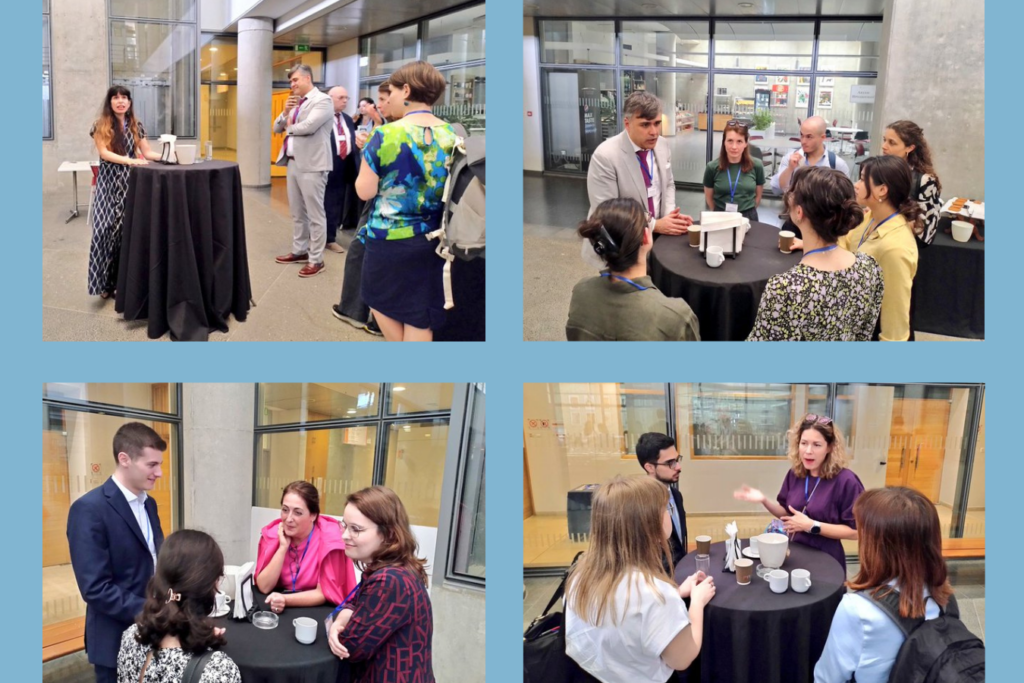 2024 ESIL Research Forum in Nicosia
2024 ESIL Research Forum in Nicosia
The 2024 ESIL Research Forum took place on Thursday 18 and Friday 19 April 2024 and was hosted by the Department of Law of the University of Cyprus. It addressed the topic: ‘Revisiting Interactions between Legal Orders’.
With over 40 presentations spanning across 10 diverse panels, the event showed how lively and varied research on international law is nowadays. A highlight of the forum was the keynote address delivered by Prof. André Nollkaemper on “International Climate Law in National Courts: from Avoidance to Alignment”. Particularly notable was the significant participation of early-career researchers, who showcased their innovative work and contributed fresh perspectives to the discourse.
The ESIL Early-Career Network Coordinating Committee also participated in the event in Nicosia. First, the Committee hosted an online Pre-meet for the Research Forum participants on Friday, 12 April. The event was well attended and served as an icebreaker connecting participants and local organisers. On the first day of the in-person conference, on 18 April, the Committee facilitated a World Café discussion on: “Engagement and Mentoring: A Conversation with Early-Career Researchers”. This format allowed ECRs to approach, discuss and ask advice from members of the ESIL Board on the topics of teaching, work-life balance, time-management, publishing and securing funding. Many thanks to the organizers, speakers and all participants!
ESIL-supported Conference on “Legal discourses on international and EU migration/refugee law in Central and Eastern Europe – Emerging new narratives or business as usual?”
On 9-10 May 2024, the Faculty of Law of Charles University (Czechia) and the Corvinus University of Budapest (Hungary) with the support of the Institute for Legal Studies– Hungary, the UN Refugee Agency (UNHCR) and the Odysseus Academic Network are organising an ESIL-supported international conference on “Legal discourses on international and EU migration/refugee law in Central and Eastern Europe: emerging new narratives or business as usual?”.
The programme of the event is now available here. Further details are available on the conference website.
5. ESIL Lectures and Dialogues
The ESIL Lecture Series hosts broadcasts of presentations on international law topics held at partner institutions, allowing the presentation to reach a wider audience of ESIL members and non-members alike. ESIL lectures are available on the ESIL website and on the ESIL YouTube Channel.
To propose an ESIL lecture, please read the ESIL Conference Series Guidelines.
On Monday 18 March 2024, the European Society of International Law, AJIL Unbound & 3 Generations of Digital Human Rights Research Project organised an ESIL Dialogue on “Ethical Considerations in Open-source Investigations”. The recording of the event is now available here.
All previous ESIL Lectures are listed here.
6. ESIL Series
The European Society of International Law Series publishes high-quality volumes on the themes of ESIL Annual Conferences and ESIL joint events. The volumes include chapters that are based on selected papers presented at ESIL events. The chapters may have been revised to fit the theme and focus of the volume, and may have been complemented by additional chapters that address topics that were not fully explored during the events but that are essential for a full coverage of the theme. Volumes in the Series will be subject to a double-blind review process by a high-level editorial board in cooperation with the Series editors, and will be published by Oxford University Press.
The ESIL Book Series is adding a new book to its series International Law and Universality, edited by Işil Aral and Jean d’Aspremont. The book takes an unflinching look at the roles and functions played by the idea of universality in international legal discourses, as well as the narratives of progress that often accompany it. In doing so, it provides a critical appraisal of the mechanisms of inclusion and exclusion attendant to international law and its universalist discursive strategies. Universality is therefore not reduced to the question of the geographical outreach of international law but is instead understood in terms of boundaries. This entails examining how the idea of universality was developed in the dominant vernaculars of international law – primarily English and French – before being universalised and imposed upon international lawyers from all traditions.
This analysis simultaneously offers an opportunity to revisit the ideologies that constitute the identity of international lawyers today, as well as the socialisation and legal educational processes that international lawyers undergo. With an emphasis on the binaries that arise from the invocation of the idea of universality in international legal discourses, this book sheds new light on the idea of universality as a fraught site of contestation in international legal discourses.
The book has now been published.
For more information, including previously published titles, please visit the Series webpage.
If you are interested in putting together a volume for inclusion in the series, please contact the General Editors, Christian J. Tams and Veronika Fikfak.
7. ESIL Paper Series
The ESIL Paper Series features papers presented at ESIL events (Annual Conferences, Research Forums, and Interest Group events). Publication in the ESIL Paper Series enables authors to disseminate their work widely and reach broader audiences without the usual delays involved in more traditional means of publication. It does not prevent the subsequent publication of papers in academic journals or edited collections.
The current Series editors are ESIL Board members Adriana Di Stefano, Federica Paddeu and Catharine Titi.
ESIL Papers will be included in the EUI CADMUS Research Repository. Thirteen papers presented at the 2023 ESIL Annual Conference in Aix-en-Provence are now available! All the papers presented at previous events from 2021 to 2023 are available here.
NOTE: Papers presented at ESIL Conferences from 2011 to 2019 can be downloaded here.
8. ESIL Reflections
ESIL Reflections offer up-to-date reflections on current issues in international law. The Reflections cover a wide range of topics relating to current developments in international law and practice as well as theoretical reflections in a way that is relatively accessible to non-experts. The aim is to foster discussion between ESIL members and international law scholars and practitioners more generally – in Europe, but also beyond. ESIL Reflections are published on this website and distributed freely to ESIL members.
The editors are Patrycja Grzebyk (editor-in-chief), Lucas Lixinski, Alina Miron, Anne Saab and Peter-Tobias Stoll.
ESIL Members who have an interest in contributing are encouraged to do so. Please contact Patrycja Grzebyk (patrycja.grzebyk@uw.edu.pl) if you would like to contribute.
Latest publications:
- ‘Change in International Law – Rules of Change or Changing Rules?’ Series Concluding Note by Sotirios-Ioannis Lekkas and Panos Merkouris
- How Custom Evolves by Enzo Cannizzaro
- Between Stability and Responsiveness in International Law – The example of Jus Cogens by Dire Tladi
- The role of amicus curiae in the ITLOS Advisory Opinion on Climate Change and International Law by Mara Tignino and Rafael Prado
- Change and the Law of Treaties: The accommodation of change under general international law and in specific treaty regimes by Christina Binder
9. News from Interest Groups
 ESIL Interest Groups are a vital part of the Society’s success and activities. A list of the groups is available on the ESIL website.
ESIL Interest Groups are a vital part of the Society’s success and activities. A list of the groups is available on the ESIL website.
Interest Group on International Criminal Justice
The Interest Group on International Criminal Justice held an online roundtable event on March 25 examining the interplay between international criminal tribunals and courts and domestic accountability. The invited discussants included Sarah Nouwen, Geoffrey Lugano, Elies van Sliedregt and Patryk Labuda, and was moderated by Julia Emtseva and Caleb Wheeler.
The event was particularly timely as domestic courts are growing ever more prominent as the fora for trials involving international crimes. The conversation was lively and insightful with a number of different topics being touched on during the course of the two-hour discussion. The Interest Group thanks all of the speakers and everyone who joined online to watch and ask questions. Particular thanks also go to Alexandre Skander Galand, who made a herculean effort in organizing the roundtable.
